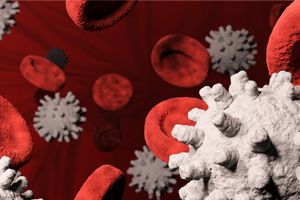
A system-wide immune response, not just a local response limited to the tumor, is what determines successful remission following cancer immunotherapy.


A system-wide immune response, not just a local response limited to the tumor, is what determines successful remission following cancer immunotherapy.

The trial, evaluating the programmed death ligand-1 inhibitor durvalumab, alone or in combination with tremelimumab, versus platinum-based chemotherapy, has refined its endpoints to include overall survival (OS) along with progression-free survival.

Here's a glimpse into what The American Journal of Managed Care’s 5th annual Patient-Centered Oncology Care® meeting had in store for its attendees.

At the 5th annual meeting of Patient-Centered Oncology Care®, hosted by The American Journal of Managed Care, November 17-18 in Baltimore, Maryland, experts with diverse experiences and backgrounds discussed the contradiction presented by immuno-oncology agents in the world of precision medicine.

Based on a retrospective meta-analysis of clinical trial data, authors of a recent paper in JAMA Oncology concluded that BRAF/MEK and programmed death receptor-1 (PD-1) inhibitors were the most effective treatments that were relatively safe in melanoma.

A small, early-stage study in patients with Hodgkin lymphoma who had failed multiple treatments or relapsed after stem cell transplant indicates that pembrolizumab could be a favorable treatment option in these patients.

An animal study conducted at the Perelman School of Medicine, University of Pennsylvania, has identified a mechanism to strengthen the immune response of T cells in cancer patients who are treated with checkpoint inhibitors.

Patients newly diagnosed with non—small cell lung cancer (NSCLC) that expresses the programmed death ligand-1 (PD-L1) protein now have a new treatment option: pembrolizumab (Keytruda).

Atezolizumab, an inhibitor of the programmed death ligand-1 protein, has been approved for the treatment of patients with non-small cell lung cancer who failed to respond to treatment with platinum-based chemotherapy.

While nivolumab failed to surpass the outcomes of chemotherapy as first-line treatment in programmed death ligand-1—expressing patients with non-small cell lung cancer (NSCLC), pembrolizumab bettered chemotherapy in improving survival in a similar cohort.

A draft guidance issued by the National Institute for Health and Care Excellence (NICE) rejected use of Merck's programmed death-1 inhibitor pembrolizumab (Keytruda) in patients diagnosed with non-small cell lung cancer (NSCLC).

At the Institute for Clinical Immuno-Oncology National Conference, a panel of care providers presented institutional experiences with immunotherapy, and how a collaborative care approach helped the process.

The cancer community has seen tremendous progress in the field of immunotherapy. However, educating patients and care providers across healthcare on this new tool remains a significant challenge.

An update on some of the recent developments in the field of immuno-oncology.

The FDA has accepted for priority review the supplemental Biologics License Application for Merck's pembrolizumab (Keytruda).

Results from the CheckMate 066 study found that the checkpoint inhibitor nivolumab performs well in improving patients' long-term quality of survival benefit in patients with advanced melanoma.

Loss-of-function mutations in Janus kinase 1 (JAK1) or Janus kinase 2 (JAK2), deletion of the wild-type allele of JAK1 or JAK2, and truncation in the antigen-presenting protein beta-2-microglobulin gene were found responsible for lack of response to interferon gamma.

During a clinical session at the annual meeting of the American Society of Clinical Oncology, researchers were tasked with sharing their data on any breakthroughs or leads with biomarkers for the new immunotherapies.

At the annual meeting of the American Society of Clinical Oncology, results were presented from a phase 1/2 trial in which patients with relapsed or refractory CD19+ B-cell malignancies were treated with CD19 CAR-T cells.

As immunotherapy-particularly the checkpoint inhibitors-continues to show promise in solid as well as liquid tumors, clinicians have been evaluating these agents in combination to improve efficacy and outcomes.

At the annual meeting of the American Society of Clinical Oncology, held June 3-7, 2016, phase 1 data from the CheckMate 143 trial was presented during a poster session.

The patient will be the focus during the 2016 annual meeting of the American Society of Clinical Oncology (ASCO), Collective Wisdom: The Future of Patient-Centered Care and Research.

A study presented at the ongoing annual meeting of the American Association for Cancer Research has confirmed that 3 commercially available diagnostic tests that measure the expression of the programmed death ligand 1 protein in non-small cell lung cancer could be interchanged.

It is imperative that we gather more mature data on a much larger number of patients to accurately assess efficacy, safety, potential harms, durability of response, and impact on disease progression and overall survival of the new immunotherapy treatments.

At the National Comprehensive Cancer Network 21st Annual Conference, John A. Thompson, MD, presented an update on where the field of melanoma treatment stands today.

259 Prospect Plains Rd, Bldg H
Cranbury, NJ 08512
© 2025 MJH Life Sciences®
All rights reserved.
